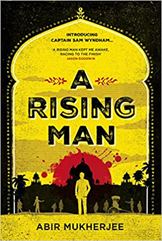In 2016, the publishers Harvill Secker/Daily Telegraph announced a crime-writing competition and the winner was Abir Mukherjee, a young chartered accountant based in London, whose five-thousand-word entry has ultimately resulted in the debut novel A Rising Man. The historical whodunit spans a few days in April 1919, beginning in a diary-like form on the 9th of April to be exact. Set in Raj-era Calcutta of the 1920s decade, it features English cop Captain Sam Wyndham, and his Indian sidekick, Sergeant Surendranath Banerjee or Surrender-not, as his British superiors were wont to call him. Unlike Sherlock Holmes’s assistant Watson, Banerjee is seen to be constantly grappling with his British job and his Indian conscience. Though the incidents are primarily narrated in the first person by Captain Wyndham, Surrender-not also enhances the story line occasionally through his comparatively more optimistic point of view.
When the story begins, we find that Captain Sam Wyndham, former Scotland Yard detective, is a new arrival to Calcutta. Desperately seeking a fresh start after his experiences during the Great War, Wyndham has been recruited to head up a new post in the police force at Lalbazar. But with barely a moment to acclimatize to his new life or to deal with the ghosts which still haunt him, Wyndham is caught up in a murder investigation that will take him into the dark underbelly of the British Raj. A senior official called MacAuley, aide to Lieutenant Governor at Writers’ Building, has been murdered and a note left in his mouth warns the British to quit India: or else. With rising political dissent and the stability of the Raj under threat, Wyndham and his team—arrogant Inspector Digby and British-educated, but Indian-born Sergeant Surrender-not Banerjee—embark on an investigation that will take them from the lanes of north Calcutta to luxurious parlours of wealthy British traders and to the seedy opium dens of the city in China Town. Then there is the great divide between the North and the South of the city, the north as Native/Black Town is full of shady lanes, by lanes, brothels, and residences of the lower- and middle-class Bengalis of the city. The White Town as a contrast has lovely, white-washed villas of British officials and is completely different in ambience and habitation. Throughout the narrative we go on hearing of the Rowlatt Act which can detain any prisoner without trial on the one hand, and on the other, we are also shown the significant presence of the hand-pulled rickshaws which Wyndham regularly uses to visit his office in Writers’ Building as well as to China Town when he needs a dose of opium smoke to clear his clogged mind.

